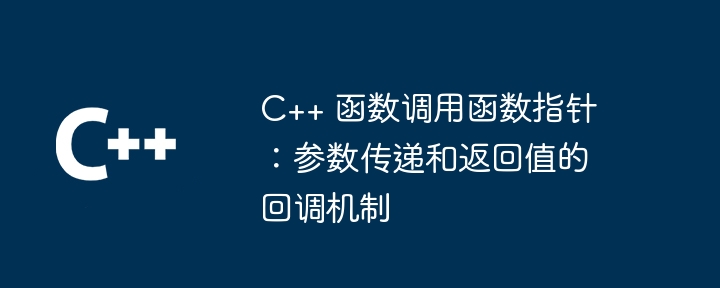Home >Backend Development >C++ >C++ function call function pointer: callback mechanism for parameter passing and return value
C++ function call function pointer: callback mechanism for parameter passing and return value
- 王林Original
- 2024-05-02 10:03:021049browse
Answer: Function pointers allow functions to be called dynamically at runtime to implement a callback mechanism. Parameter passing: Function pointers can be passed as parameters to higher-order functions, which call them and return the results. Callback mechanism of return value: A function can return a function pointer to implement a callback mechanism, so that a function can be passed as the return value of another function.

#C Function call function pointer: callback mechanism for parameter passing and return value
Function pointer is a pointer to a function , which allows us to call functions dynamically. They are useful when implementing callback mechanisms that allow one function to be passed as an argument to another function.
Parameter passing
Consider the following example:
// 需要一个整数参数的函数
int add(int x) { return x + 1; }
// 将函数指针传递给更高阶函数
int higher_order(int (*func)(int)) {
return func(10);
}
int main() {
// 将 "add" 函数的指针传递给 "higher_order"
int result = higher_order(add);
cout << result << endl; // 输出:11
}Here, the higher_order() function receives a function pointer as parameter . It calls the passed function and returns the result. In the main() function, we call higher_order() and pass the pointer to the add function. higher_order() Passes the value 10 to the add function and returns the result 11.
Return value callback mechanism
We can use function pointers to implement the callback mechanism, using one function as the return value of another function. For example:
// 返回一个函数指针的函数
int* create_adder(int x) {
return new int (*)(int) { [x] (int y) { return x + y; } };
}
int main() {
// 创建返回加法器的函数指针
int* adder = create_adder(10);
// 使用函数指针调用函数
int result = adder(20);
cout << result << endl; // 输出:30
// 释放函数指针分配的内存
delete adder;
}In the example, the create_adder() function creates a function pointer that returns an adder function. The adder function takes one argument and adds it to the supplied x value. In the main() function, we create a function pointer that returns the adder. We call the function using a function pointer and the function returns 30. Finally, we free the memory allocated to the function pointer.
Through function pointers, we can implement advanced function calls, such as parameter passing and return value callback mechanisms. This provides great flexibility in dynamically binding functions at runtime.
The above is the detailed content of C++ function call function pointer: callback mechanism for parameter passing and return value. For more information, please follow other related articles on the PHP Chinese website!

